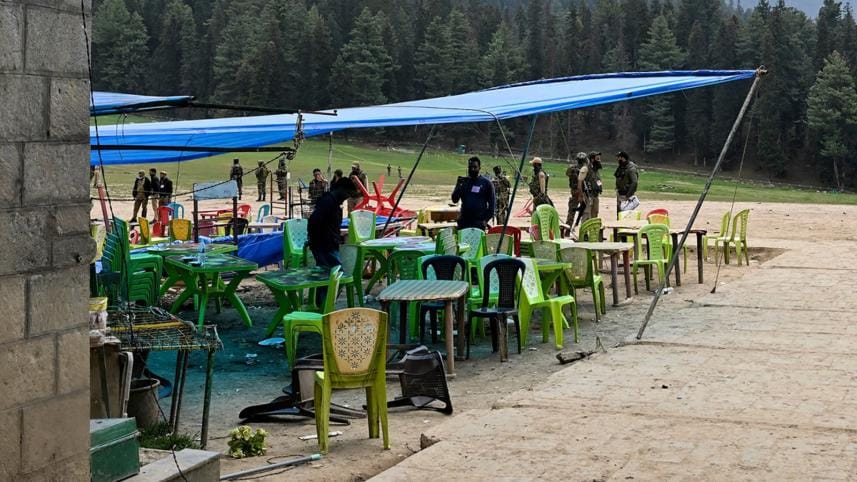Kashmir terror attack: India blames Pakistan, downgrades ties

India announced a raft of measures to downgrade its ties with Pakistan yesterday, a day after suspected militants killed 26 men at a tourist destination in Kashmir in the worst attack on civilians in the country in nearly two decades.
Indian Foreign Secretary Vikram Misri told a media briefing that the cross-border linkages of the attack had been "brought out" at a special meeting of the Cabinet Committee on Security (CCS), headed by Indian Prime Minister Narendra Modi, after which it was decided to act against Pakistan.
He said New Delhi would suspend with immediate effect the bilateral treaty of 1960 on the sharing of the trans-border Indus river.
"The Indus Waters Treaty of 1960 will be held in abeyance with immediate effect, until Pakistan credibly and irrevocably abjures its support for cross-border terrorism," Misri told reporters in New Delhi.
The 1960 Indus Water Treaty gave India and Pakistan three Himalayan rivers each and the right to hydropower and irrigation resources.
Misri added that the border crossing at Attari-Wagah border "will be closed with immediate effect", although those with valid travel documents may return to Pakistan before May 1.
Three defence advisers in the Pakistani high commission in New Delhi were declared persona non grata and asked to leave, Misri said, adding that the overall strength of the Indian high commission in Islamabad will be reduced to 30 from 55.

India also announced a halt to visas for Pakistani nationals under the SAARC Visa Exemption Scheme, our New Delhi correspondent quoted him as saying.
Misri said India is also withdrawing its army, air and navy advisers from its High Commission in Islamabad.
He said any visa under the SAARC Visa Exemption Service issued in the past to Pakistani nationals is deemed cancelled. He also asked any Pakistani national currently in India under SVES visa to leave the country within four hours.
"The CCS reviewed the overall security situation and directed all forces to maintain high vigil and resolved that the perpetrators of the Pahalgam attack will be brought to justice and their sponsors held to account," Misri said.
"India will be unrelenting in the pursuit of those who have committed acts of terror, or conspired to make them possible," he added.
At least 17 people were also injured in the shooting that took place on Tuesday in the Baisaran valley in the Pahalgam area of the scenic, Himalayan federal territory of Jammu and Kashmir. The dead included 25 Indians and one Nepalese national, police said.
It was the worst attack on civilians in India since the 2008 Mumbai shootings, and shattered the relative calm in Kashmir, where tourism has boomed as anti-India insurgency has waned in recent years.
Meanwhile, Pakistan yesterday said the government has decided to convene a rare meeting of its National Security Committee to respond to diplomatic measures imposed by India over the attack in Kashmir.
The committee -- composed of senior civil and military officials and summoned only in cases of external threat or major terror attack -- will meet today, Deputy Prime Minister Ishaq Dar, who is also the foreign minister, said on X.
A little-known militant group, the "Kashmir Resistance," claimed responsibility for the attack in a social media message. It expressed discontent that more than 85,000 "outsiders" had been settled in the region, spurring a "demographic change".
In a fresh statement yesterday, the group said that the "individuals targeted were not ordinary tourists; instead, they were linked to and affiliated with Indian security agencies".
Indian security agencies say Kashmir Resistance, also known as The Resistance Front, is a front for Pakistan-based militant organisations such as Lashkar-e-Taiba and Hizbul Mujahideen.
Pakistan denies accusations that it supports militant violence in Kashmir and says it only provides moral, political and diplomatic support to the insurgency there.
Meanwhile, Indian security forces in Jammu and Kashmir were conducting a major manhunt yesterday.
J&K Chief Minister Omar Abdullah reported an "exodus of our guests", as tourists scrambled to leave, cramming into buses and taxis, while hoteliers reported a surge of cancellations.



 For all latest news, follow The Daily Star's Google News channel.
For all latest news, follow The Daily Star's Google News channel.
Comments